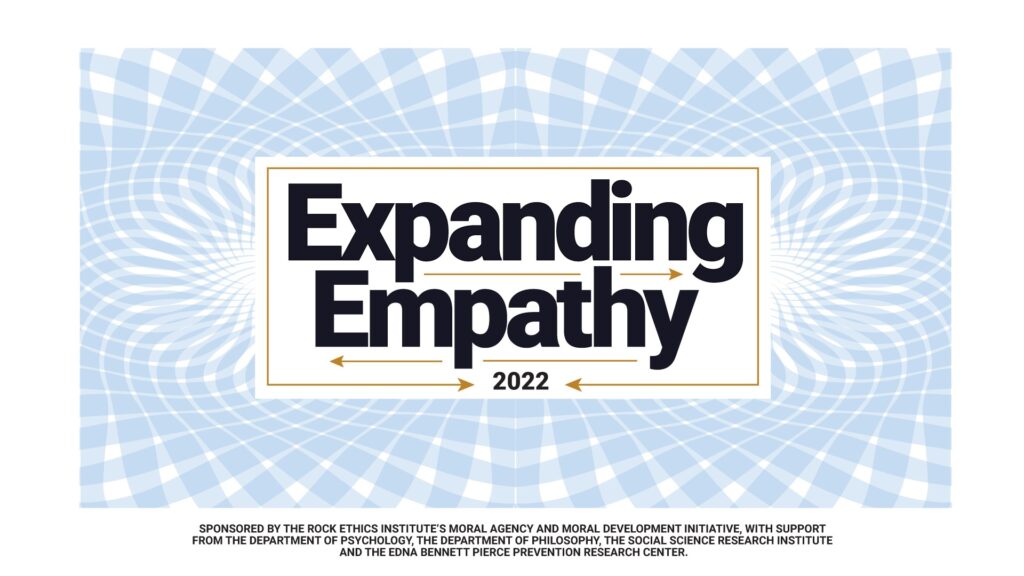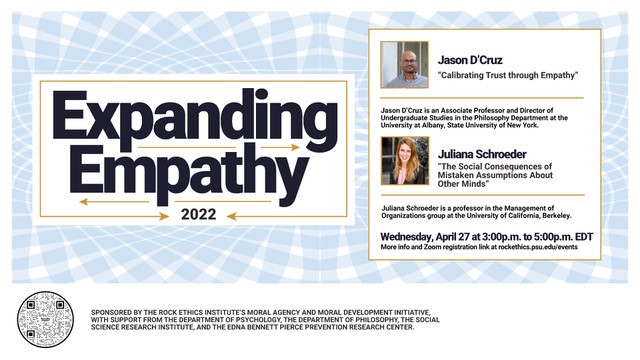Expanding Empathy Lecture Series: Jason D’Cruz & Juliana Schroeder
The Expanding Empathy series at the Rock Ethics Institute is entering its fourth year, as a core feature of the Moral Agency and Moral Development Initiative led by Dr. Daryl Cameron. In this year’s iteration, Dr. Cameron and Dr. Martina Orlandi, Post-Doctoral Scholar in Engaged Ethics at the Rock Ethics Institute and Schreyer Honors College (as well as member of Dr. Cameron’s Empathy & Moral Psychology Lab) are co-organizing the series. To highlight the value of interdisciplinary conversation, each panel consists of one psychologist and one philosopher, who will each give a talk on a shared theme and then find points of convergence and divergence in live discussion with audience afterward.
Additionally, for each panel, Dr. Orlandi will be arranging a podcast (“N.7”) with each speaker to highlight their background, and Dr. Cameron will be organizing a meeting of the Moral Agency Workshop for informal conversation and networking at 1:00 p.m. EDT, Friday, April 29, on Zoom.
The overall goal of the Expanding Empathy series is to highlight the value of cutting-edge scientific and philosophical work on empathy and moral judgment, and to highlight the importance of the interdisciplinary moral psychology research being done here at Penn State as well. This year, in addition to the primary sponsorship from the Rock Ethics Institute, the series also will be receiving support from the Psychology Department, Philosophy Department, Edna Bennett Pierce Prevention Research Center, and Social Science Research Institute.

“Calibrating Trust through Empathy” by Jason D’Cruz
Abstract: To calibrate our own trust or distrust of another person, it helps to know whether they trust or distrust us. In particular, we want to know whether they perceive the relationship as one of competition or cooperation, exploitation or mutual care. Empathy furnishes a vital window to this perspective. The capacity for other-oriented perspective taking allows us to apprehend quickly whether another person encounters us from an unguarded (trusting) or defensive (distrusting) stance. I will describe how this apprehension provides both motivational impetus and rational warrant for our own attitudes of trust or distrust. Delineating this interpersonal dynamic helps us to understand why trust can be disarming and why mutual distrust is so difficult to unseat.

Jason D’Cruz is an Associate Professor and Director of Undergraduate Studies in the Philosophy Department at the University at Albany, State University of New York and the Principal Investigator for Trustworthy AI from a User Perspective, a project funded by a grant from the SUNY-IBM AI Research Alliance. D’Cruz works primarily in ethics and moral psychology on the topics of trust, promising, rationalization, and self-deception.
“The Social Consequences of Mistaken Assumptions About Other Minds” by Juliana Schroeder
Abstract: Aristotle once said that “man is by nature a social animal” but, in a world filled with social divides (different groups of people with markedly different values and opinions), productive engagement can be challenging. I theorize that the common psychological root of humanity’s social friction is that people lack direct access into others’ minds – and must therefore engage in inferential guesswork to assess others’ state of mind and ascertain their presence of mind. At least two types of consequences emerge from this lack of direct access. First, people may misread others’ mental states, such as others’ preferences and intentions, leading them to ineffectively coordinate or connect with others. Second, people may overlook others’ mental capacities, leading them to engage ineffectively across lines of difference such as providing ineffective or inadequate help to needy individuals or mismanaging conflict with disagreeing individuals. I provide evidence for these social consequences in a series of research projects.
 Juliana Schroeder is an award-winning professor in the Management of Organizations group at the Haas School of Business. She is a faculty affiliate in the Social Psychology Department, the Cognition Department, and the Center for Human-Compatible AI at UC Berkeley. She teaches the Negotiations and Conflict Resolution course at Haas.
Juliana Schroeder is an award-winning professor in the Management of Organizations group at the Haas School of Business. She is a faculty affiliate in the Social Psychology Department, the Cognition Department, and the Center for Human-Compatible AI at UC Berkeley. She teaches the Negotiations and Conflict Resolution course at Haas.
Schroeder’s research examines how people make social judgments and decisions. She studies the psychological processes underlying how people think about the minds of those around them, and how their judgments then influence their decisions and interactions.
Her research has been published in a wide range of academic journals and in several book chapters. It has been featured by media outlets such as The New York Times, The Washington Post, Harvard Business Review, NPR, and the Today Show. She has received funding from the National Science Foundation and awards from the Association for Psychological Science and the American Psychological Association.
In addition to conducting research and teaching, Schroeder co-founded and directs the Psychology of Technology Institute, which supports and advances scientific research studying the psychological consequences and antecedents of technological advancements. Her educational background includes a B.A. in Psychology and Economics from the University of Virginia, an M.B.A. from the Chicago Booth School of Business, and an M.A. and Ph.D. in Psychology and Business from the University of Chicago.
